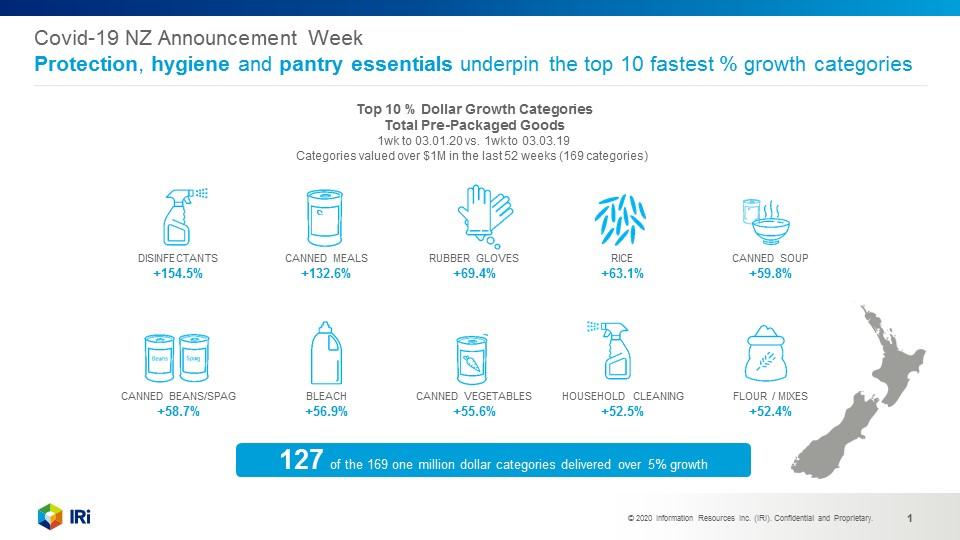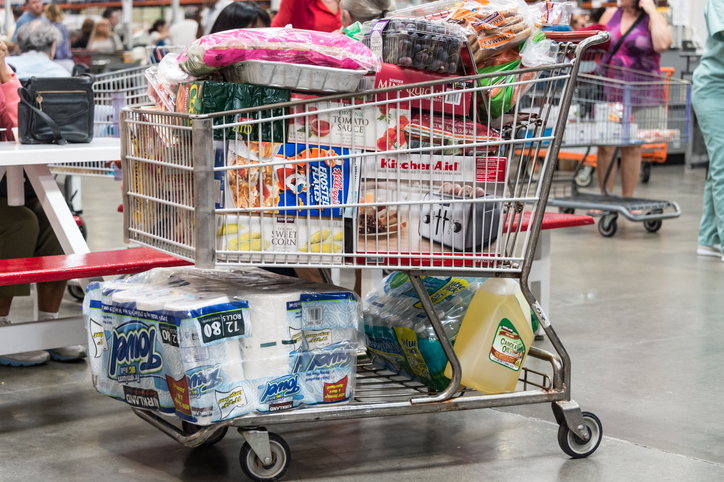With the fifth case of COVID-19 confirmed in New Zealand, shoppers are clearly starting to stock up on essential ‘pandemic pantry’ items such as canned goods, paracetamol and toilet tissue.
Samantha Firsow, Shopper and Consumer Consultant – Solutions & Innovations at IRI commented: “Over the past week I’m sure you have all experienced your share of panic-buying after the announcement of the first case of Coronavirus in NZ. There were 5 categories that delivered over $1million of growth across the week, among these the largest % growth category unsurprisingly was Toilet Tissue. Carbonated Beverages and Breakfast also made the top 5, a sign-of ‘social distancing’ driving in-home consumption. Get in touch with IRI if you want to learn more.”

FGC Chief Executive Katherine Rich said: “FGC has been in contact with grocery retail leaders Steve Anderson, Chris Quin and Natalie Davis expressing support and collaboration. The queues in some Auckland stores due to panic buying are being managed as well as can be expected.”
Officials from the Ministry for Primary Industries (MPI) and the Ministry of Foreign Affairs and Trade (MFAT) are monitoring how the novel coronavirus (COVID-19) is affecting New Zealand primary industries and businesses.
MPI, MFAT and NZTE are in close contact with other officials as they continue to monitor the trade and economic impacts on New Zealand. MFAT says the full extent of those impacts depends on how prolonged the outbreak is and how widespread it becomes. It warns the longer it persists, the more likely it is the full range of exports will be affected.
Go to Coronavirus and the Effects on Trade https://www.mpi.govt.nz/exporting/coronavirus-and-the-effects-on-trade/ and Information for Exporters https://www.nzte.govt.nz/coronavirus.
Meanwhile, events and international travel are also affected by the Covid-19 outbreak. The International Air Transport Association (IATA) has doubled its estimated impact from Covid-19 to at least $63 billion—$113 billion should the disease continue spreading. Airlines flying in Asia, home to the outbreak’s epicenter, have already cut available seat miles by 23% this month, according to consulting firm Oliver Wyman. As the outbreak intensifies, other regions are making similar cuts, with only Africa and Latin America (where minimal cases have been reported) so far unscathed.
Protecting staff and your business
Have you updated your pandemic plan and your staff communications?
Reiterate to all employees the basic messages of handwashing and hygiene. It’s time to put up the Ministry of Health materials in staff rooms and on notice boards if you haven’t already. https://www.health.govt.nz/our-work/diseases-and-conditions/covid-19-novel-coronavirus
For businesses in New Zealand it’s time to update or put in place a pandemic plan, says Katherine Rich. “I know bigger companies plan for all sorts of business interruption scenarios, but for smaller businesses it can be one of those things that doesn’t make it to the priority list when there are limited resources.”
FGC members can email admin@fgc.org.nz for more information on pandemic planning.
Quick Facts
- Coronaviruses (CoV) are a large family of viruses that cause illness ranging from the common cold to more severe diseases such as Severe Acute Respiratory Syndrome (SARS-CoV). A novel coronavirus (nCoV) is a new strain that has not been previously identified in humans.
- Coronaviruses are zoonotic, meaning they are transmitted between animals and people.
- Common signs of infection include respiratory symptoms, fever, cough, shortness of breath and breathing difficulties. In more severe cases, infection can cause pneumonia, severe acute respiratory syndrome, kidney failure and even death.
- Standard recommendations to prevent infection spread include regular hand washing, covering mouth and nose when coughing and sneezing, thoroughly cooking meat and eggs. Avoid close contact with anyone showing symptoms of respiratory illness such as coughing and sneezing.
- People coming into New Zealand should check information for travellers arriving to New Zealand as they may be subject to border controls or asked to self-isolate.
- People who have visited countries or areas of concern and who have developed symptoms of fever, cough or shortness of breath need to seek medical advice (phone Healthline’s dedicated COVID-19 number 0800 358 5453 or contact your GP, including phoning ahead of your visit).
For more information and updates visit https://www.who.int/emergencies/diseases/novel-coronavirus-2019



